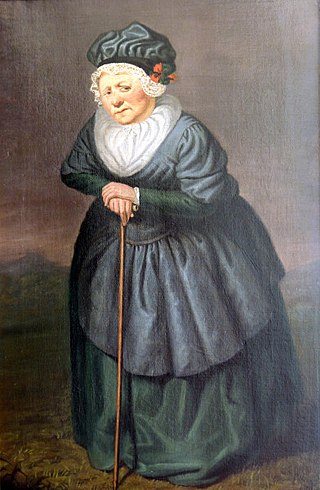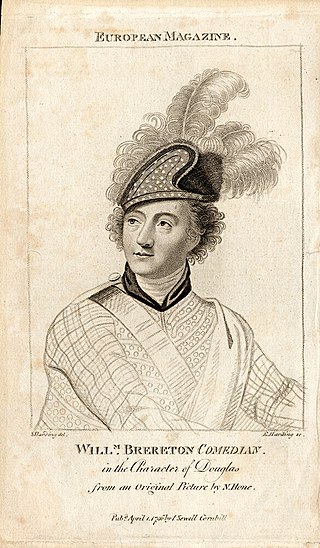Related Research Articles

Sophia Baddeley born Sophia Snow was an English actress, singer and courtesan.

Spranger Barry was an Irish actor.

David Garrick was an English actor, playwright, theatre manager and producer who influenced nearly all aspects of European theatrical practice throughout the 18th century, and was a pupil and friend of Samuel Johnson. He appeared in several amateur theatricals, and with his appearance in the title role of Shakespeare's Richard III, audiences and managers began to take notice.
Hugh Kelly was an Irish dramatist and poet. From the 1760s he was employed as a propagandist for the British government, attacking members of the Opposition. After arriving in London in 1760 to work as a staymaker, he soon turned to become a writer and made a living as a journalist. In 1766 he published Thespis, a long poem about the acting profession, which gained him wide attention. He followed up this success with the novel Memoirs of a Magdalen in 1767. He ultimately became known for his stage plays such as False Delicacy and A Word to the Wise.

Charles Holland was an English actor, born in Chiswick, the son of a baker.

Elizabeth Hartley (1750?–1824) was one of the most celebrated actresses on the London stage in the 18th century. She was also notorious for the role she played in society scandals including "The Vauxhall Affray".
James Wrighten was an English actor. He trained to work as a copperplate printer, but left that occupation for the stage. He moved from Birmingham to London and made his debut at Theatre Royal, Drury Lane on 21 February 1779. He afterwards acted in numerous roles at the theatre until 1793, beginning work as a prompter in 1786.

Mary Bradshaw was a British stage actress at Theatre Royal, Drury Lane for 37 years. She appeared with David Garrick and she was included in a painting by Johann Zoffany.

Mary Bulkley, née Wilford, known professionally as Mrs Bulkley, Miss Bulkley, and later Mrs Barresford, was an English eighteenth-century dancer and comedy stage actress. She performed at various theatres, especially Covent Garden Theatre, the Theatre Royal, Dublin, the Theatre Royal, Edinburgh, the Theatre Royal Haymarket and Shrewsbury Theatre. She performed in all or most of the Shakespearean comedies, and in several tragedies, besides many contemporary comedy plays. She played the part of Hamlet at least twice. She was considered a beauty when young, and her talent was praised. She married George Bulkley and later Captain Ebenezer Barresford, and openly took several lovers. Her early career was successful, but later she was hissed on stage due to her extra-marital affairs, and she died in poverty.
James Lacy (1696-1774) was a British stage actor and theatre manager.
Henry Giffard was a British stage actor and theatre manager.
John Sowdon was an Irish stage actor, singer and theater manager in the eighteenth century.
Edward Berry (1706-1760) was a British stage actor. He was a long-standing member of the Drury Lane company, appearing frequently with David Garrick.
Samuel Cautherley (c.1747–1805) was a British stage actor. His surname is sometimes spelt as Cautherly.
Thomas Griffith (1680-1744) was an Irish stage actor and theatre manager.
Richard Hurst was a British stage actor.
Maria Smith born Maria Harris aka Mrs Smith was a British stage actress of the late eighteenth century.
Howard Usher was an English stage actor of the eighteenth century. He had a lengthy career in London's West End beginning at Drury Lane during the 1739–1740 season. A member of the company, he played smaller, supporting roles in a large number of productions. He also acted at the London fairs during the summer and at Richmond in Surrey and the Jacobs Well Theatre in Bristol. In 1750 he moved to Covent Garden for four years, before returning to Drury Lane for a further four years in 1758. He then moved to Ireland where he spent a number of years at the Smock Alley Theatre and Crow Street Theatre in Dublin and also appeared at the Theatre Royal, Cork. By this time he was married to the actress Maria Usher who appeared with him in Dublin. In 1774 he was recruited by David Garrick to return to Drury Lane. In 1778 he joined the company at the Theatre Royal, Haymarket and remained part of it for the next twenty one years. His final appearance was a reprise of his original role Sir Walter Manny in George Colman the Younger's The Surrender of Calais on 10 September 1799.
Astley Bransby was an English stage actor and theatre manager who was a long-standing member of the company of the Theatre Royal, Drury Lane under David Garrick. His first known performance was Captain Plume in George Farquhar's The Recruiting Officer in 1744 at the Haymarket where he was part of a group of young actors being trained by Charles Macklin. The following year he made his first appearance at Drury Lane and remained there for three decades, with the expection of a four-year spell at the Theatre Royal, Covent Garden from 1749 to 1753. He played a vast number of supporting roles in the repertory as well as occasionally originating new roles. He retired from thestage in 1777 from ill health. He was a co-manager of Richmond Theatre.

William Brereton was an English stage actor. He was a member of the company of the Theatre Royal, Drury Lane for eighteen years, under the management of David Garrick and subsequently Richard Brinsley Sheridan. He was born in Bath, the son of William Brereton who was master of ceremonies in the spa town. He made his Drury Lane debut in the title role of Douglas by John Home in 1768. Weakened by alcoholism and mental instability, he died in an asylum in Hoxton in 1787. He was married to the actress Priscilla Brereton, who later married John Philip Kemble. He was said to have had an unrequited passion for Sarah Siddons which contributed to his mental decline.
References
- ↑ The Plays of David Garrick: Volume II, 1767-1775 p.365